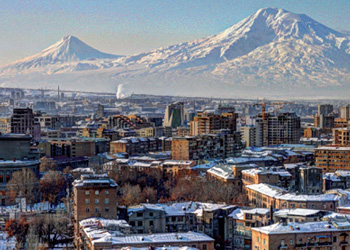A new perspective on Armenia

Calouste Sarkis Gulbenkian was born in the Ottoman Empire, to a renowned Armenian family with a long track record for sponsoring the arts and works of beneficence. While still young, Calouste became fluent in both French and English even though his native language would always remain the Western Armenian spoken in the former Anatolia prior to the Armenian genocide. Subsequentely, Western Armenian became a language spoken only in the diaspora and, in recent years, has steadily lost ground to the extent that UNESCO lists it among the languages most at threat of extinction worldwide. The Gulbenkian Foundation, through its Armenian Communities Department, has contributed towards safeguarding this language not only through the editing and publishing of books in Western Armenian but also in funding schools in the diaspora. In its action plan, the department, run since February by Razmik Panossian and with Martin Essayan serving as trustee, seeks to invest still further in the protection of Western Armenian and fostering an intellectual movement around the teaching and academic research ongoing on the language. As the current director states: “the question should be approached from a wide-reaching perspective and hence support for the schools is going to represent just one of the factors” and working more towards the common objective than diverse and disparate requests for support. As regards publications, paper-based editions will continue even though the strategy will move onto strengthening the Armenian presence in the digital world by “fostering and encouraging every type of publication with online versions” to bring about a greater level of interconnection in the communities spread worldwide. This will also prove another way of promoting the Western Armenian language.
The Armenian diaspora
Prior to drafting the new Foundation activity plan for Armenian Communities, Razmik Panossian first visited the various communities spread worldwide: Armenia, Lebanon, Turkey, France, the United Kingdom, Israel, the United States and Canada. “I wanted to learn about not only their respective needs but also about their expectations”, said Razmik Panossian before referring to the warm welcome that he received and the countless thanks for the support provided by the Foundation over the course of recent decades.
Study grants represent a large slice of this support and the new director promises their continuation but with other formats “of a more proactive nature and better focused on specific questions or subjects”. This change involves the “modernisation of the fields of study”, transforming the current Armenian study grants in support for “research on the contemporary issues of the 20th and 21st centuries”.
Another important percentage of the grants target Armenian students in the diaspora and these shall also be subject to changes in order to encourage “the best and most brilliant students” to continue with their studies.
The situation in Syria
With regard to the substantial Armenian community in Aleppo, Syria, from where a significant number of persons (around ten thousand) were forced to seek refuge in other countries, the Armenian Communities Service is to establish a special grant for refugee students in order to enable them to continue with their studies.
Aleppo is one of the worst affected cities by the war in Syria. It was home to a community made up of around 40,000 Armenian speakers of the Western
Armenian language. Razmik Panossian speaks of the “impressive resilience” of these communities and the support provided by the Foundation to the Armenian Church and other organisations for humanitarian aid to the refugees. The Service has thus far donated around $100,000 in aid and continues to monitor the prevailing situation.
Showing Armenia to Portugal
Within a year, the Foundation will be staging a week purpose dedicated to Armenian culture with music, exhibitions and conferences and thereby conjugating the work of various different areas of the Foundation. Raising awareness about the country of origin of Calouste Sarkis
Gulbenkian is one dimension but the program objectives and events also constitute “a space for thinking about and preparing for the future”, which the new director aims to hold on an annual basis.
Razmik Panossian also refers to the need for considering Armenia and the difficult moment currently ongoing, “supporting organisations in civil society and the younger generations”. The Foundation seeks to play “an active role in the connections between Armenia and the rest of the world, especially in academic terms”, promising intervention and management based on socially transformative projects.
